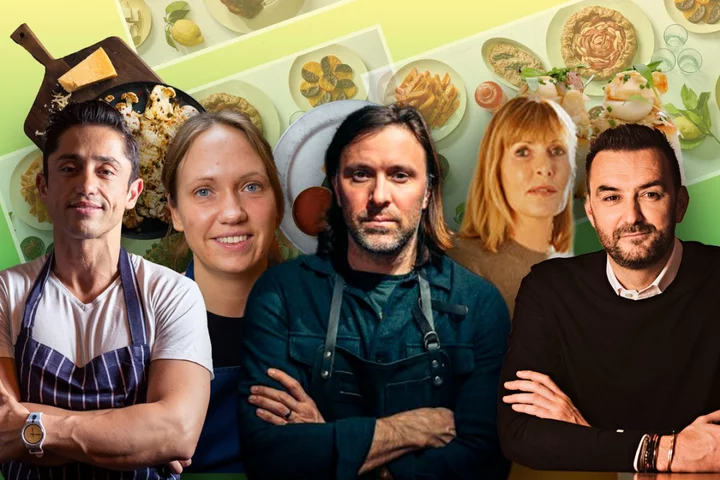
OECD Warns Global Economy Risks Losing Momentum
The world’s advanced economies are heading into a deepening slowdown as markedly higher interest rates take a hefty
2023-11-29 18:22

Rising Taxes to Squeeze UK Living Standards for Longer, OECD Says
Rising taxes mean UK households face several more years of falling living standards even though inflation is coming
2023-11-29 18:20

Pension withdrawals by residents leaving Hong Kong in Q3 up 1.7% on year
HONG KONG Residents leaving Hong Kong for good withdrew a total of HK$2.213 billion ($283.72 million) from their
2023-11-29 18:20

Danny Dyer returning for The Football Factory sequel
A sequel to 'The Football Factory' is in the pipeline with Danny Dyer reprising his role as hooligan Tommy Johnson.
2023-11-29 18:18

UK Watchdog to Examine Supermarket Two-Tier Pricing Plans
Britain’s antitrust watchdog will investigate a two-tier pricing system developing in supermarkets as a result of loyalty programs
2023-11-29 18:00

21 alternative Christmas recipes from top British chefs
If you’re sick and tired of turkey and all the trimmings, why not be a little bit adventurous this Christmas? We’ve asked some top chefs in the UK for a selection of weird and wonderful recipes to ramp up your festivities at home. From an Iberico pork wellington with Galician chestnuts and serrano ham from Brindisa’s Monika Linton to traditional Swedish delights from the minds behind Ekstedt at The Yard, make this year’s menu one to remember. Cheddar and brown ale rarebit with cauliflower cheese and cranberry and almond crumble Recipe by: Andrew Pern and Joshua Brummell, York Minster Refectory Ingredients: 1 large cauliflower For the rarebit: 120ml Black Sheep or other brown ale 25g butter 25g plain flour 140g Fountains Gold Cheddar or other mature cheese 1 tsp English mustard 1 tbsp Hendersons relish For the crumble: 25g flaked almonds 25g Panko breadcrumbs 25g dried cranberries Method: 1. Melt the butter in a pan and stir in the flour, add the ale and whisk until smooth. On a low heat add the cheese, mustard and Hendersons relish, whisk until smooth. 2. Remove the florets of your cauliflower and blanch in boiling water for 2-3 mins or until tender. 3. Combine the flaked almonds, breadcrumbs and cranberries in a bowl. 4. Put cauliflower in an ovenproof dish and top with the rarebit and the almond and breadcrumb mix. 5. Bake at 180 degrees until golden and piping hot. Coronation crab vol-au-vent with flaked almons and sweet’n’sour raisins Recipe by: Andrew Pern and Joshua Brummell, York Minster Refectory This is a perfect festive canape and one of our signature dishes that is a nod to our Royal opening. Here is a simplified version for people to make at home and wow their guests this festive period. Ingredients: Shop bought vol-au-vent cases Picked white crab meat Gold quality mayonnaise Madras curry paste Lemon juice Chopped coriander Method: 1. Combine the curry paste with mayonnaise, lemon juice and coriander to taste. Use this to bind white crab. 2. Put crab mix into vol-au-vent cases, top with flaked almonds and raisins. Kalupol roast chicken Recipe by: Karan Gokhani, Hoppers Serves: 4 Ingredients: 1.2-1.5kg chicken, spatchcocked For the marinade: 1 tbsp basmati rice 1 tbsp grated fresh coconut 1 tbsp minced garlic 1 tsp minced ginger ¾ tbsp chilli powder 3 tbsp roasted curry powder 1 lemongrass stick 8-10 curry leaves 1 tsp salt 3 tbsp vegetable oil Method: 1. To make the marinade palace the rice in a wok over a medium-high heat and toast for 4 minutes. Then add the concur and continue toasting for 10 more minutes until both the rice and coconut are deep golden brown. Be careful not to burn them. 2. Once cooled, transfer to a pestle and mortar or space grinder and pound to a fine powder. Add the remaining marinade ingredients and pound or grind to a paste. Rub the paste all over the chicken, then cover and refrigerate overnight. 3. When ready to cook, preheat the oven to 200C/180C fan/400F. Place the chicken on a large roasting tray lined with foil and roast for 40 minutes, then increase the heat to 220C/200C fan/430F and cook the chicken for a further 15 minutes. Check that the chicken is cooked by piercing the thickest part of the thigh with a knife. The juices should run clear, if not, return the chicken to the oven covered with foil for a further 5 minutes and check again. Once cooked, remove from the oven and rest for 10 minutes, before carving and serving with any roasting juices from the tray. 4. For the ideal Sri Lankan roast, serve alongside a sambol or mallung, some curry sauce and pol rotis. Burani spice mix Recipe by: Karan Gokhani, Hoppers Serves: 4 Ingredients: 1 tsp fennel seeds ½ tsp cumin seeds 4 cloves 2.5cm cinnamon stick 4 green cardamom pods 1 tbsp coriander seeds 1 whole red chilli, deseeded 1 tsp black peppercorns Method: 1. Roast all the ingredients in a dry frying pan (skillet) over a medium heat for 4 minutes. Cool completely and grind to a fine powder in a pestle and mortar or spice grinder. Mutton rolls Recipe by: Karan Gokhani, Hoppers Makes: about 500g filling, enough for 10 rolls Ingredients: For the filling: 250g mutton shoulder boneless 250g potatoes, peeled and cut into 5 cm chunks 3 tbsp oil 75g onion, finely chopped 3 green cardamom pods 9cm cinnamon stick 1 tbsp minced garlic ½ tbsp minced ginger ½ tbsp chilli powder ½ tbsp roasted curry powder ½ tbsp unroasted curry powder 10-12 curry leaves, chopped ¼ tsp ground turmeric 1 tbsp tomato paste ½ tsp black peppercorns, crushed Juice of ½ lime 3 tsp salt Method: 1. Remove any sinew and skin from the mutton and chop it up roughly. Then place in a food processor and pulse for a minute, until you have a coarse mince (ground meat). If you don’t have a food processor, you can just chop it up as finely as possible to resemble mince. 2. Place the potatoes in a saucepan , cover with cold water and add 2 tsp salt. Bring to the boil and cook until tender, then drain and allow to cool slightly. Mash the potatoes roughly or break up with a fork, then set aside. You want the potatoes to be quite dry and lumpy 3. Meanwhile, place a heavy-based pan over a medium heat and add the oil. Once hot, add the onion along with cardamom pods, cinamon, and a pinch of salt, and cook until slightly softened, 3-4 minutes. Add the garlic and ginger and continue to cook for a minute. 4. Increase the heat to high and add the mutton. Cook, stirring occasionally until the meat is well browned and the juices have evaporated, about 8-10 minutes. It’s essential to make sure the pan is not overcrowded, as otherwise the meat will begin to stew instead of frying. You want a thin, even layer of meat in the pan, and if your pan isn’t big enough, fry the meat in two batches. If you do so, you may need a little more oil than the recipe calls for. 5. Reduce the heat to a medium-low and add the chilli powder, curry powders, curry leaves and turmeric. Cook for 30 seconds, then add the tomato paste along with 150 ml water and continue cooking for another 3-5 minutes. Remove from the heat and mix in the potatoes, black pepper and lime, then season to taste. Nial’s Christmas stuffing Recipe by: Karan Gokhani, Hoppers Serves: 4 as a trimming Ingredients: 200g boiling potatoes (peeled and cut into 1cm dice) 30g unsalted butter 1 tbsp oil 250g brown onions, finely chopped Pinch of salt 225g chestnut mushrooms 450g plain sausagemeat 225 breadcrumbs 15g parsley, chopped 15g sage leaves, chopped 1 tbsp wholegrain mustard 1 tbsp Worcestershire 1½ tsp sea salt 1 tsp cumin seeds 1 tsp coriander seeds 1 tsp black peppercorns 3 green cardamom pods 2 cloves Pinch of nutmeg, freshly grated Pinch of ground cinnamon Method: 1. Preheat the oven to 210C/190C fan/320F. Place the potatoes in a separate pan and cover with cold salted water (the water should taste like sea water). Bring to the boil and cook for 10 minutes, then drain thoroughly and set aside. 2. Meanwhile, warm the butter and oil in a heavy-based pan and add the onions. Sprinkle over a pinch of salt, mix well and then cook over a medium heat for 15-20 minutes until beautifully caramelised. Then transfer them to a bowl and add the mushrooms to the pan, with a splash of extra oil if the pan seems dry. Cook until reduced to a third in size and golden in colour, about 10 minutes, then transfer to the bowl with the onions. Finally mix the cooled onions and mushrooms, sausagemeat, potatoes, breadcrumbs, parsely, sage, mustard, Worcestershire sauce and salt. 3. Place the cumin and coriander seeds, black peppercorns, cardamom and cloves in a dry drying pan skillet) over a high heat. Toast for 2 minutes until fragrant, then allow to cool slightly and transfer to a pestle and mortar. Grind to a powder along with the nutmeg and cinnamon and add to the rest of the stuffing ingredients. Mix everything thoroughly, then roll into 5cm (2in-) diameter balls and place onto a greased baking sheet. Bake for 30 minutes until golden and fully cooked through. 4. Serve alongside a traditional roast chicken, duck, goose or turkey. 14 carat hummus Recipe by: Eran Tibi, Bala Baya/Kapara Serves: 8 hungry people (with generous leftovers for fuelling your Boxing Day adventures) Ingredients: For the hummus: 375g chickpeas, cooked and drained 750g peeled carrots, roasted to tender perfection 250g tahini 100g olive oil Juice of half a lemon 10g (about 1 tsp) salt For the preserved lemon (a nifty shortcut): 50g water 5 lemons, peeled with zest julienned 25g (about 2 tbsp) Maldon salt For the carrot jam: 100g sugar 25g (about 2 tbsp) Maldon salt 125g maple syrup 7 small carrots, finely diced 67.5g harissa paste 50g olive oil 250ml orange juice For the garnish: Freshly chopped coriander Method: For the hummus: 1. Start by roasting your peeled carrots. Toss them with olive oil and a pinch of salt, then pop them in the oven at 200C (392F) for 20 minutes until they’re beautifully tender. 2. Once those vibrant orange gems have cooled, blend them with chickpeas, tahini, olive oil, and a squeeze of lemon juice. Blitz away until your hummus is silky smooth. 3. Season your creation with a touch more lemon and a pinch of salt if needed. This hummus should taste like a burst of Mediterranean sunshine on your taste buds. For the preserved lemon (a nifty shortcut): 1. For a zesty twist, we’ve got a clever shortcut for preserved lemon. Julienne – fancy word for thin strips – the lemon peel and juice all those juicy lemons. 2. In a pan, combine water, a sprinkle of Maldon salt, lemon juice, and zest. Bring this lively concoction to a gentle simmer and let it dance for 20 minutes. 3. Once the lemony magic is done, set it aside. It’s the secret touch that elevates your hummus. For the carrot jam: 1. Time to craft our unforgettable carrot jam. Dice those little orange heroes into ½cm pieces. 2. In a pan, throw in sugar, a pinch of Maldon salt, maple syrup, diced carrots, harissa, olive oil, and a splash of orange juice. 3. Let the jam come to life by reducing it slowly until it reaches a jammy consistency (about 50% reduction). Drop a bit on a cold surface to check consistency – it should be thick, like a sweet and spicy embrace. 4. Once it’s reached jam-like perfection, taste and adjust the seasoning if needed. To assemble: 1. Now comes the fun part! Lay out your “14 carat hummus” on a platter or individual plates making well-like whole in the middle for the rest. 2. Drizzle that fabulous preserved lemon all over, creating a burst of zesty excitement. 3. Spoon on that exquisite carrot jam. It’s like the jewel on the crown of your hummus empire. 4. Sprinkle the whole affair with freshly chopped coriander. It’s the final flourish that takes your hummus to dazzling heights. Chocolate and amarena Christmas log Recipe by: Cyril Lignac, Bar des Pres Prep time: 30 minutes | Cooking time: 7 minutes Serves: 4 Ingredients: For the chocolate rolled biscuit: 3 organic whole eggs 4 organic egg whites 2 organic egg yolks 85g + 135g caster sugar 85g flour 50g cocoa powder Butter for the plate For the mascarpone whipped cream: 125g mascarpone 25cl of very cold 35% full fat liquid cream 65g caster sugar 1 vanilla pod For the decor: 3 tbsp cherry jam 2 tbsp tablespoon amarena cherry in syrup 40g dark chocolate shavings Method: 1. Preheat the oven to 210C. 2. In a salad bowl, whisk the egg whites with 85g of sugar so that they form a bird’s beak. Then in a second bowl, beat the yolks with the whole eggs and the 135g of ribbon sugar, add the flour and the cocoa powder with a spatula. Gently mix the two devices together. Pour into a buttered silicone-rimmed baking sheet or onto a silicone sheet placed on a baking sheet. Spread lightly to even out the biscuit using an angled spatula. Bake for 7 minutes. 3. At the end of cooking, gently unmold the biscuit upside down on a damp cloth, trim the edges to obtain a neat rectangle, roll in the cloth and leave to cool. 4. Split the vanilla pod in half and collect the vanilla pulp, place it in a ramekin. Use the pod to make vanilla sugar, for example. In a very cold salad bowl, pour the mascarpone, beat it lightly using a hand mixer, pour the very cold liquid cream, continue to whip and pour the sugar with the vanilla pulp, whipped cream. Set aside one half in a bowl and the other half in a plastic bag fitted with a size 10 plain nozzle. Chill for 1 hour. 5. Coat the biscuit with cherry jam, then with mascarpone whipped cream, add a few amarena cherries. Roll the biscuit without crushing it and place it in the dish. 6. On the log, place the rest of the mascarpone whipped cream using your pocket and make lines on top. Sprinkle with dark chocolate shavings and add 4 amarena cherries. Reserve the log in the fridge. Iberico wellington Recipe by: Monika Linton, Brindisa An alternative Christmas centrepiece dish or just a delicious dinner party recipe. Spain’s famous ibérico acorn-fed pork, with Galician chestnuts and serrano ham. Prep time: 10 mins | Cooking time: 40 mins Serves: 4 Ingredients: 1 Brindisa Ibérico pork tenderloin (450g) 6 slices Brindisa serrano ham 75g Brindisa Galician cooked chestnuts 100g mushrooms ½ tbsp chopped rosemary 2 tbsp sherry wine 320g ready-rolled puff pastry 1 tbsp Brindisa extra virgin olive oil 1 egg, beaten Salt and pepper to season Method: 1. To make the mushroom and chestnut duxelle: in a food processor, using the pulse function, blitz the mushrooms until they are the size of a grain of rice, then place them into a bowl. Repeat with the chestnuts then mix them with the mushrooms. 2. Heat the olive oil in a frying pan, add the mushrooms and chestnuts, along with the rosemary and the sherry wine. Cook, stirring occasionally, until the wine has evaporated and the mixture has softened (10min approx). Reserve and leave the duxelle to cool. 3. Season the tenderloin and sear in a hot frying pan or on a griddle. Leave to cool. 4. When all the ingredients are at room temperature, lay the slices of ham in a sheet of cling film. Add a layer of the duxelle and then place the tenderloin on top. Wrap the tenderloin tightly with the help of the cling film. Let it rest in the fridge for at least a couple of hours. 5. Pre-heat the oven to 200C, 180C fan, gas mark 6. Unroll the pastry onto a baking sheet. Trim a 2cm strip off one long side and reserve. 6. Place the ham-wrapped tenderloin in the centre (having removed the cling film). Brush the edges of the pastry with beaten egg then fold the pastry to completely encase the tenderloin. 7. Use the reserved pastry to cut shapes to decorate the Wellington, then brush with the remaining egg. 8. Bake for 30 minutes. 9. Leave to rest for at least 5 minutes before slicing to serve. Little tip: This recipe lends itself to advance preparation, perfect when entertaining. The whole Wellington can be made the day before, ready to bake for minimum stress! Sobrasada roast potatoes Recipe by: Brindisa in collaboration with Sophie Rushton-Smith These flavour packed roast potatoes can be served with a traditional Sunday roast or are delicious paired with a big salad or as a side. Prep time: 5 minutes | Cooking time: 35 minutes Serves: 3-4 Ingredients: 4-6 large Maris Piper potatoes, peeled and quartered Brindisa Arbequina Olive Oil 1 sprig of Rosemary Brindisa Mallorquín Mild Sobrasada Method: 1. Chop the potatoes into quarters and parboil them in a large pan of salted water for 15-20 minutes. 2. Once the potatoes are softened, drain them and give them a good shake in the colander to ruffle the edges up. 3. Add the potatoes to a large frying pan on a hot heat. Add to the pan olive oil, a big sprig of rosemary and chunks of sobrasada. 4. Cook the potatoes for around 20 minutes, turning them over at regular intervals so that each side is golden and crispy. Spanish cauliflower cheese Recipe by: Monika Linton, Brindisa A Spanish twist on a popular family classic. Prep time: 15 minutes | Cooking time: 40 minutes Serves: 4 as a side 2 as a main with salad and crusty bread Ingredients: 500ml full fat milk 1 small onion 1 clove Bay leaf 1 large or 2 small heads of cauliflower 2 tbsp Brindisa Arbequina extra virgin olive oil 60g butter 25g plain flour 100g Brindisa Mahón cheese, grated plus extra for topping 50g Brindisa Galmesan cheese, grated plus extra for topping Nutmeg, grated Salt and pepper 50g panko breadcrumbs 2 tsp Brindisa Mallorcan unsmoked mild paprika 2 tbsp Brindisa capers Method: 1. Heat the milk with an onion studded with clove and the bay leaf and then leave to infuse for 15 mins. 2. Slice the cauliflower into 1 inch “steaks”. Lay out on a greaseproof paper covered baking tray. Brush with olive oil and roast at 200C, 180C fan, gas mark 6 for 20 mins, turning halfway and brushing the other side. They should have a nice touch of char. 3. Whilst they cook, melt the butter in a pan over a low to medium heat and then stir in the flour, stirring and cooking for a couple of minutes. 4. Remove the onion and bay leaf from the milk and gradually add to the butter and flour, whisking constantly until you have a smooth sauce. Then leave to simmer on the lowest heat for 5 mins until thickened, stirring from time to time. 5. Add the grated cheeses (reserving the extra for the topping), nutmeg and salt and pepper to taste. 6. Transfer the cauliflower to a roasting dish and pour over the cheese sauce. Top with the remaining grated cheese and breadcrumbs. Put back in the oven for 10 minutes until the cheese has browned/or put under the grill. Finally dust with the paprika and sprinkle over the capers. Trout rillettes Recipe by: Skye Gyngell, Spring and Heckfield Place Ingredients: 350g fresh trout fillet, skin removed 175g butter Bay leaf 1 leek finely chopped 1 tbsp of Pernod 100ml white wine 150g smoked trout 4 tbsp creme fraiche Zest of 1 lemon Salt and pepper ½ cup clarified butter Dill to garnish Method: 1. Season the trout with salt and pepper. Heat two tablespoons of butter and sweat the leek for 10 mins until very soft, do not let the leek change in colour it must remain on a low heat. 2. Add trout and bay leaf, Pernod and wine. Cover with a lid or piece of parchment and cook for 2-3 mins over super low heat. The trout should be just cooked through. 3. Remove the fish and strain the liquid into a small pot. 4. Reduce liquid to two tbspn. Keep stirring to prevent the liquid from burning on the sides of the pan. 5. Flake the cooked trout with the smoked trout – then add creme fraiche, wine reduction, lemon zest and remaining butter (softened) mix together with a fork. Season with salt and pepper and serve. 6. It will keep well in the fridge for 2 days. Marmalade glazed ham Recipe by: Skye Gyngell, Spring and Heckfield Place Ingredients: 1 leg of ham 5 carrots 4 leeks 10 juniper berries 15 peppercorns 5 fresh bay leaves Whole Cloves 5 tbsp marmalade (or any other good-quality jam or strong marmalade) 4 tbsp Dijon mustard (or grainy, if you prefer) Method: 1. Place the ham in a bucket, cover with cold water and leave to soak for 24 hours. This is done to take the saltiness out of it. Remove the ham and then place it in a deep stockpot. 2. Roughly chop the carrots, celery and leeks and add them to the pot. Then add the juniper berries, peppercorns and bay leaves. Cover with cold water and bring to the boil. This can take up to one and a half hours. Turn down to a gentle simmer and cook for a further two hours. For the glaze: 2 tbsp marmalade 3 tbsp soft brown sugar, such as muscovado Finely grated zest and juice of one orange 150ml/5oz white wine A handful of cloves 1 tbsp Dijon mustard (or grainy, if you prefer) – for serving Method: 1. To make the glaze, simply mix the marmalade, sugar, orange juice and zest and wine together until you have a loose paste. 2. Remove the skin from the cooked ham, leaving as much fat on as possible, score it evenly all over, and stud each diamond shape with a clove. Using a pastry brush, brush half the glaze evenly over the outside of the ham. Place in a baking tray on the middle shelf of the oven. Roast for 10 minutes then brush the rest of the glaze on top. Cook for 20 minutes or until sticky, golden brown and slightly set. 3. Serve with grainy mustard or chutney. Skye likes to serve this with dauphinoise potatoes and pickled red cabbage. Chicken-liver pâté Serves: 2 Ingredients: 500g/1lb chicken livers 200ml/7fl oz milk 200g/7oz unsalted butter 1 medium onion, chopped 2 cloves garlic, very finely chopped A small bunch of thyme, leaves only 2 fresh bay leaves 100ml/3 fl oz Cognac A generous grinding of black pepper Top tip: It is important to use the freshest chicken livers. Look for those pale in colour, as their flavour is mellower and sweeter. Method: 1. Soak the chicken livers in milk for two hours, then discard the milk. 2. Add four tablespoons of butter to a pan and place over a medium heat. Once the butter has melted and just begun to foam, add the onion and cook until soft and transparent – about 5 minutes. Now add the garlic, thyme and bay, and cook for a further 5 minutes. Add the chicken livers and cook for 2-3 minutes: the livers should be brown on the inside and still pink in the middle. Add the Cognac, turn up the heat a little and cook until just slightly reduced. Remove from the heat and discard the bay leaves. Allow to cool slightly then place in a food processor. Add the rest of the butter in small pieces, purée until smooth. 3. Line an eight-inch terrine mould with butter and spoon in the pâté. Allow to cool completely before covering with a thin layer of butter and placing in the fridge to chill and firm – a minimum of 6 hours. We like to drop a whole bay leaf on top of the butter as it cools, so it looks beautiful when you serve it at the table. Eat alongside toast, and a few cornichons if you like. Christmas pudding Recipe by: Skye Gyngell, Spring and Heckfield Place I unashamedly adore Christmas pudding and I’m perplexed by those who say they don’t. What could possibly be more tempting than a steaming pudding – irresistibly fragrant with a mix of spices, molasses, sugar, candied peel, dried fruit and brandy- arriving at the table? These puddings will happily keep for a year in the fridge, their flavour becoming even more delicious. Makes: 2 puddings, each serves 6 Ingredients: 360g suet grated 170g plain flour 180g fresh white breadcrumbs 150g candied peel 350g seedless raisins 350g currants 200g sultanas 170g dark muscovado sugar Grated zest of a lemon Grated zest of an orange ½ nutmeg grated ½ tsp salt ½ tsp ground cinnamon Juice of ½ a lemon 4 organic free-range large eggs, lightly beaten 100ml Armagnac 550ml whole milk Butter, to grease To serve: Small ladleful of brandy Method: 1. Stir all the pudding ingredients together in a large mixing bowl until evenly combined; the mixture should feel quite wet. Cover the bowl with a clean cloth and leave to stand in a cool place overnight. 2. The following day pack the mixture firmly into two lightly greased 1 litre pudding basins. Cover the surface with a disc of baking parchment, then cover each basin with a double layer of parchment to secure under the rim with string. Place a trivet to each of two large saucepans (or cook the pudding one at a time). Stand the basin(s) on the trivet(s). Pour in enough boiling water to come two-thirds of the way up the side of the basin and put the lid on. 3. Bring to the boil over a high heat, then lower the heat slightly and cook for 6 hours, topping up the pan with boiling water as necessary. Lift out the pudding basin and leave the pudding to cool to room temperature. Re-cover with clean baking parchment and a layer of foil and place in the fridge or store in a cool, dry cupboard until needed. 4. On Christmas morning, boil the pudding (as above) for 1½-2 hours. 5. Warm the brandy just before serving. Turn out the pudding into a warm plate, pour on the warm brandy and set alight. Bring the flaming pudding to the table. Serve brandy butter alongside, and perhaps a jug of thick pouring cream for those who prefer it. 6. Make your own brandy butter using just three ingredients: unsalted butter, icing sugar and Armagnac. The proportions don’t really matter- it’s the quality of the ingredients that counts. Allow 175g of unsalted butter for 6 generous servings. Beat the butter until soft and creamy, then beat in about 150g icing sugar and 2-3 tbsp Armagnac to taste. 7. To seal the Christmas pudding ready for steaming, cover with a generous double layer of baking parchment, placing it in the centre as shown (this allows room for the pudding to expand during steaming). Tie securely in place with kitchen string, positioning it tightly around the basin just below the rim. Leave a length of string to act as a handle for lifting the basin out of the pan. Meringue with chestnuts and cream Ingredients: 6 organic free range egg whites 360g caster sugar ¾ tsp vanilla extract Small jar of sweetened chestnut puree 4-6 tbsp double cream 70 per cent chocolate, for grating Icing sugar, for dusting Method: 1. Preheat the oven to 150C and line a baking tray. Place egg whites into an electric mixer, add a pinch of salt and whisk slowly. As the whites break down, increase the speed, adding the sugar gradually and the vanilla extract and whisking until stiff peaks form. Shape into 20 meringues on parchment paper, leaving room for them to expand in the oven. Place on the middle shelf, lower temperature to 120C and cook for 30 minutes, then leave to cool. To serve, spoon chestnut puree and a dash of cream on to each meringue. Finish with grated chocolate and icing sugar. Cured salmon with sweet mustard sauce Recipe by: Niklas Ekstedt and Therese Andersson, Ekstedt at The Yard This is a dish we have all year round, however, for Christmas we infuse it with some more festive flavours such as juniper, star anise and orange. The salmon would usually be served with fresh new potatoes and sweet mustard sauce. Ingredients: 500g salmon For the cure mix: 50g salt 50g sugar 10g blitz juniper berries 10g blitz star anis Sweet mustard sauce 1 tbsp mustard (half Dijon, half spice brown) 1 tbsp white wine vinegar 1 tbsp sugar ¾ cup neutral oil ¼ cup fresh chopped dill Salt, pepper to taste Method: For the cured salmon (takes 2-4 days): 1. Mix the salt, sugar, juniper berries, star anise. 2. Cover the pieces of salmon with the cure mix in a bag or on a deep tray, and leave covered in the fridge for 48 hours. 3. You will know when the salmon is ready when the end of the salmon is slightly hard to the touch and the salmon’s colour is slightly darker. 4. Serve in thin slices. For the mustard sauce: 5. Whisk mustard, vinegar and sugar, then add oil a tablespoon at a time to emulsify (thicken). 6. Finish with dill. Pickled herring Recipe by: Niklas Ekstedt and Therese Andersson, Ekstedt at The Yard Pickled herring can be be served with many different flavours, it is a type of preserved fish popular in Scandinavian. The herring is first salted, and then they are pickled in a mixture of vinegar, water, sugar and spices. We eat this with new potato and vasterbotten cheese served on crispy bread. This is something I always have in my fridge and eat year round, my favourite way to eat it is mustard herring. Ingredients: 420g plain herring For the pickled liquor: 50ml white wine vinegar 25g caster sugar 5 white peppercorns 1 red onion, finely chopped 3 cloves 2 bay leaves 1 tsp yellow mustard seed 1 carrot, finely chopped Small bunch of dill Method: 1. Bring the vinegar, sugar and 150ml water to a simmer in a small pan. Stir until the sugar dissolves, then remove from the heat. 2. Combine the remaining ingredients in a medium-sized bowl, and pour over the brine and leave to cool completely. 3. Drain the herring and rinse in cold water, then add to the brine and leave in the fridge for at least one day before serving. To make mustard herring: 1. Mix together 1tbsp wholegrain mustard, 1tsp, Dijon mustard, 2 tsp sugar, 2 tsp white wine vinegar 50ml oil until you have a thick sauce. Add 1 tsp chopped dill. Swedish Christmas ham (julskinka) Recipe by: Niklas Ekstedt and Therese Andersson, Ekstedt at The Yard This is one of the dishes that you will find at all the Swedish Christmas tables. Swedish Christmas ham is made special by its mustard crumb topping, which is delicious and adds texture, crunch and a lovely tang from the mustard. This is best served straight out of the oven, when it is still a little bit warm. I like to eat a thin slice on top of a piece of crispy bread with a little bit of mustard on. Ingredients: 1 egg 3 tbsp wholegrain mustard 1 tsp sugar ½ tsp salt 60g bread crumble Method: 1. In a bowl, whisk together the egg, mustard, sugar, salt and half of the breadcrumb. 2. Once combined, spread the paste all over the top of the ham. Once you have an even layer on top, add the rest of the breadcrumbs evenly across the topping. Pop the ham in the oven on 185 degrees for 15-20 min. 3. Serve the whole Christmas ham on the table, and sliced as needed. Serve with a good sweet coarse mustard. Mumma Recipe by: Niklas Ekstedt and Therese Andersson, Ekstedt at The Yard Mumma is a Swedish beer cocktail that is traditionally served during the Christmas. Ingredients: 500ml lager 500ml stout 250ml lemonade 75ml madeira A splash of gin A splash of cardamom powder Method: 1. Pour everything gently into a large jug. Stir to combine. Serve in large wine or7 brandy glasses. Mulled wine Recipe by: Niklas Ekstedt and Therese Andersson, Ekstedt at The Yard We usually start the dinner with mulled wine, served a little bit warm with almonds and raisins. Ingredients: 2 large orange 1 litre red wine 1¼ cups brandy ½ cups dark brown sugar 2 cinnamon sticks 6 whole cloves 3 cardamom pod Method: 1. Using a peeler, remove the peel in strips from 1 orange, then juice the orange. Slice the other orange into rounds and reserve for garnish. 2. In a nonreactive saucepan, combine the orange peel, juice and the rest of the ingredients. Stir over medium heat until the sugar dissolves for about 2 minutes. Increase the heat to high, bring the mixture to a boil, then immediately reduce the heat to low. Simmer gently until the flavours meld for about 30 minutes. Strain the mixture, discarding the solids. Read More Beauty advent calendars 2021: Our guide to this year’s top treats 13 best tech gifts to spoil a gadget geek this Christmas 10 best luxury Christmas crackers for dressing up your dining table Why the Spanish are calling bull on M&S’s chorizo paella croquetas! Why restaurant influencers have just ruined your dinner The Independent high street Christmas sandwich and drink taste test
2023-11-29 17:59

Greek Premier Sees No Impact on UK Relations From Elgin Marbles Feud
Greece’s relationship with the UK won’t be affected by Prime Minister Rishi Sunak’s decision to cancel a planned
2023-11-29 17:55

Binance’s Reboot Faces Test in Thailand After $4.3 Billion US Fine
Binance Holdings Ltd.’s attempt to turn the page on costly regulatory violations faces a test in Thailand, where
2023-11-29 17:54

Halfords Slumps After UK Automotive Retailer Cuts Guidance
Halfords Group Plc slid as much as 22% on Wednesday after the British automotive and bicycling retailer cut
2023-11-29 17:46

Germany Risks €24 Billion Budget Hole, Lawmaker Says
Germany has a potential hole in its 2024 budget of as much as €24 billion ($26.4 billion), though
2023-11-29 17:20

The Savoy hotel review: Expect to be treated like royalty at London’s iconic Grande Dame (for a price)
In a nutshell: The grande dame of luxury London hotels, with a remarkable history and stellar service. Expect to be treated like royalty – for a price. The neighbourhood Only the heart of central London, my dear. Opened in 1889, London’s first luxury hotel is located on a bend of the River Thames on the Strand. Reached via Savoy Court – the only road in the UK where cars must drive on the right to enable guests to board and exit from the driver’s side of a car – this Grade II listed building benefits from being both perfectly situated for some of the city’s superlative attractions, while also transporting you to an altogether more magical place. It enjoys enviable access to some of London’s most popular cultural institutions, including the Royal Opera House, Somerset House, the National Gallery, the Courtauld Institute of Art and the National Portrait Gallery; and with a plum position in Theatreland, the Lyceum, Vaudeville, Adelphi, Duchess, Novello and Aldwych theatres are all just minutes away, in addition to the Savoy’s own namesake playhouse. The Victoria Embankment Gardens and Cleopatra’s Needle are situated at the rear of the hotel, while the South Bank and its attractions – including the Royal Festival Hall, National Theatre, Southbank Centre, Hayward Gallery and London Eye – are across the water. Read more on London travel: The best London hotels Where to shop and stay in London How to do winter in London right The vibe Opulent, old-school glamour without the stuffiness. Guests pass through the famous Art Deco front entrance before being ushered into the mahogany-panelled arrival hall, complete with marble columns, a black-and-white checkerboard marble floor, and plentiful vases of freshly cut floral displays. Luxury practically oozes from the walls, as does history; the roll-call of previous guests includes literary figures (Oscar Wilde, F Scott Fitzgerald, Mark Twain), former prime ministers (Winston Churchill), royalty (Queen Elizabeth II) and stars of stage and screen (Marlene Dietrich, Marilyn Monroe, Frank Sinatra, Elizabeth Taylor, Bob Dylan, The Beatles, Charlie Chaplin, Rihanna and Taylor Swift). The aesthetic is largely split between Art Deco and Edwardian, whether you’re sipping afternoon tea in the grand, light-filled Thames Foyer, complete with glass-domed atrium and winter garden gazebo, or quaffing fizz and celeb-spotting in the American Bar, London’s longest-surviving cocktail bar. Bed and bath The Savoy is home to 267 luxury guest rooms and suites decorated in a classic Edwardian or Art Deco style, ranging from Superior Queen Rooms, replete with marble bathrooms and bespoke Penhaligon’s toiletries, to the landmark Royal Suite (from £15,875 per night) designed by Gucci, whose founder worked at The Savoy as a luggage porter and lift boy as a young man. Many of the rooms feature outstanding panoramic views across the River Thames and South Bank that take in some of London’s most famous landmarks, including Big Ben, the London Eye and Oxo Tower. Suites include complimentary minibars, free-standing bathtubs and rainwater showers, Murano glass chandeliers, his and hers washbasins, chauffeur and butler services – and Boodles catalogues, in the event you fancy dropping six figures on some ice. Food and drink The American Bar is possibly one of the most famous hotel bars in the world, making a visit an essential element of any trip to London. Opened in 1893, its influence is global when it comes to the art of mixology, with celebrated bartenders creating the Hanky Panky, the White Lady, Prairie Oyster (as devoured by Sally Bowles in Cabaret) and the Moon Walk, Neil Armstrong’s bespoke concoction and first drink after his legendary trip to space. Famous patrons include Ernest Hemingway, Winston Churchill (a regular who kept his own bottle of whisky here), and F Scott Fitzgerald, while photographs of other acclaimed visitors can be found on the walls. Service is exquisite and discreet while the vibe is chic, with a pianist tickling the ivories. The newer Beaufort Bar, open Thursday to Saturday for champagne and cocktails, is the epitome of cocktail glamour, with black velvet furnishings, dim lighting and thousands of pounds worth of gold leaf on the walls. Dress up for this date night destination, which is also home to the original stage where George Gershwin performed the British premiere of “Rhapsody in Blue”. Competing with London’s culinary offerings is no mean feat, but the Savoy’s three restaurants – all of which are franchised to multi-Michelin-star awarded celebrity chef Gordon Ramsay – are more than fit for purpose. Specialising in shellfish and seafood, the River Restaurant is an absolute treat for pescatarians. The beef wellington – a house special – is also worth splashing out on, with juicy, tender meat encased in crisp and flaky pastry. Book a seat by the window and indulge in a seafood platter for the ultimate decadent dining experience. Described by Ramsay as the definition of “gourmet glamour”, the famous Savoy Grill’s sumptuous interiors – mirrored walls and plush velvets – have recently undergone a makeover to evoke the razzle-dazzle of the 1920s. Former regulars include the Queen Mother, Elizabeth Taylor, Noel Coward and Alfred Hitchcock; it’s also the place where Hollywood royalty, Vivien Leigh and Laurence Olivier, first set eyes on each other, with Leigh declaring then and there that she would marry Olivier. Hero dishes include lobster thermidor, Louet-Feisser oysters and duck a l’orange. Elsewhere, the more intimate Restaurant 1890 has just 26 covers and offers a modern French tasting menu that takes inspiration from influential former Savoy chef and culinary pioneer, Georges Auguste Escoffier. Located above the hotel entrance, try and bag a window seat for the ultimate people watching spot. Public areas Even the hotel’s lobby offers a sumptuous place to take the weight off your feet and soak up the atmosphere. Guests preferring to indulge further can head to the beauty and fitness centre. In addition to a range of treatments, such as massages and facials, resident and non-resident guests and members can take a dip in the 10m pool, equipped with a jet stream to swim against the current. The men’s and women’s changing areas also include a cosy sauna and steam room. A gym with weights and cardiovascular equipment is adjacent. Nuts and bolts Room count: 237 Freebies: Standard rooms provide complimentary tea, coffee, soft drinks and two beers, while suites extend this to include welcome drinks and butler service (one item of clothing for pressing per guest). Wifi: Free. Extra charges: None. Early check-in and late check-out are subject to availability, with charges determined on a case-by-case basis. Disability access: There are three accessible Deluxe King rooms, which feature wheel-in-shower and accessible-friendly amenities. All dining and bar venues are accessible; staff are available to assist guests with step-free routes. Pet policy: Well behaved pets up to 20lbs are welcome within the Savoy’s suites and rooms for a daily charge of £25. They are also welcome at the River Restaurant by Gordon Ramsay. Bottom line Best thing: The service is exceptional. That, and the sheer, unadulterated glamour, darling. Worst thing: The spa is on the petite side. Perfect for: A special occasion. Treat yourself – or someone else. It’s an unforgettable experience. Not right for: Large, noisy groups. Have some decorum! Instagram from: The dramatic red lift. London’s first electric lift was dubbed “an ascending room” by founder Richard D’Oyly Carte, with nervous passengers handed a glass of brandy to calm their nerves before entering. Its historic status, plus gold doors, red lacquer interior and leather bench for two make it an ideal place for posing. thesavoylondon.com Read more of our best luxury London hotel reviews Read More The best luxury hotels in London for a stylish city break The best spa hotels in London for pampering and indulgence Best boutique hotels in London 2022 How to do winter in London right Could a night at this ‘sleep retreat’ cure my insomnia? Loch Fyne Hotel and Spa, the ultimate secluded stay in the Scottish Highlands
2023-11-29 17:17

Philips Sleep Apnea Machine Safety Fears Grow; Shares Slump
Royal Philips NV slumped after the Food and Drug Administration warned about a new safety issue involving the
2023-11-29 17:16
